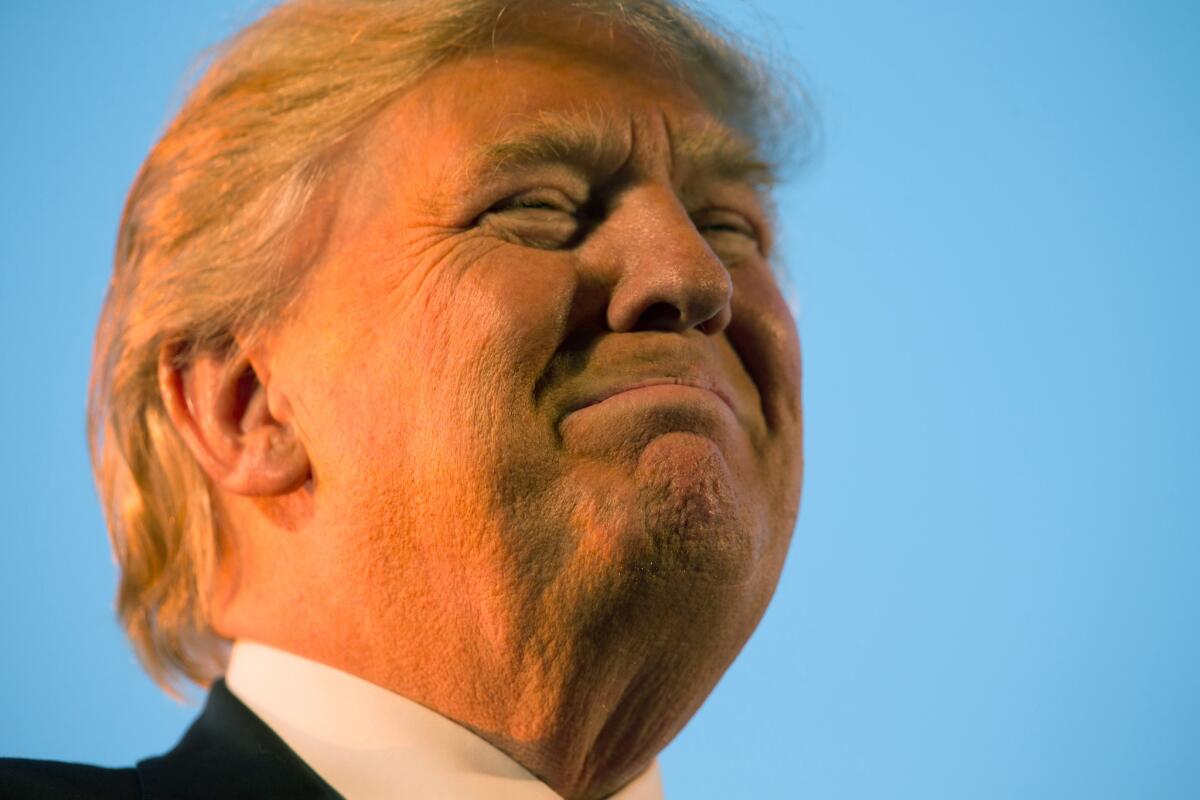Editorial: Why Super Tuesday could stand to be a little less super

Republican presidential candidate Donald Trump pauses during while speaking at a rally in Millington, Tenn. on Feb. 27.
- Share via
Whatever their results, the spate of primaries and caucuses aptly known as Super Tuesday will be a major milestone in the 2016 presidential campaign. After a preliminary round of contests waged one state at a time, voters in 13 states will simultaneously indicate their preferences for a nominee for president, resulting in a sizable yield of delegates to the party conventions: almost half the number needed to secure the Republican nomination and a third of the number needed for the Democratic nod.
But “major” doesn’t necessarily mean decisive. In fact, there are good reasons to hope that Super Tuesday doesn’t decisively settle the race in either party.
Join the conversation on Facebook >>
That is especially true in the GOP, where another strong showing by Donald Trump might inspire a stampede toward the braggadocious businessman. Even before Super Tuesday, Trump received endorsements from New Jersey Gov. Chris Christie, himself a former presidential candidate, and Sen. Jeff Sessions of Alabama. Ominously, some Republicans are already reconciling themselves to a Trump nomination even as others are adopting the Twitter hashtag “#NeverTrump.”
We say “ominously” because Trump is spectacularly unfit to serve as president. His lack of government experience might not be disqualifying if he had demonstrated any serious interest in domestic or foreign policy. But “Make America Great Again” is a slogan, not a platform. And on the one issue he has addressed in detail — immigration — his prescriptions are preposterous (a “beautiful” wall along the U.S.-Mexican border, a temporary ban on Muslim immigrants) and his rhetoric is hateful.
Trump also has demonstrated a recklessness and hypersensitivity to criticism that would be disastrous even in a well-informed president. From his threats to start trade wars and reinstitute torture to his personal attacks on his opponents, he seems a better candidate for a trip to the principal’s office than the Oval Office.
But a post-Super Tuesday stampede would be bad for Republicans for other reasons. A majority of the states voting Tuesday are in the South or Southwest, including Texas, Georgia, Alabama and Tennessee. Ohio, where Gov. John Kasich serves as governor, and Florida, the home state of Sen. Marco Rubio, don’t hold their primaries until March 15. Other states, including California, won’t vote until June.
Another strong showing by Donald Trump might inspire a stampede toward the braggadocious businessman
Ordinarily, it is true, nominations are sewn up earlier than that — the Republican National Committee declared Mitt Romney the presumptive nominee in April 2012 — but this year is anything but ordinary. The fierce opposition Trump has inspired within the party has raised the possibility that the nominee might not be clear until the Republican convention in July. A longer campaign also would allow Trump’s remaining opponent or opponents to elaborate on — and, in some cases, reconsider — their positions. Some of those stances are deeply troubling, including those of Rubio and Sen. Ted Cruz on climate change, healthcare, abortion, gay marriage and the agreement that placed limits on Iran’s nuclear program.
Rubio and Cruz haven’t engaged in Trump’s hateful and xenophobic language. (Indeed, they both criticized him for an evasive answer about whether he disavowed the endorsement from former Ku Klux Klan leader David Duke.) Yet the two senators haven’t offered much of a challenge to Trump on immigration, as both try to distance themselves from their previous displays of reasonableness regarding the millions of immigrants in the country illegally. Kasich has adopted a more moderate posture, saying he would offer those immigrants “a path to legalization, but not a path to citizenship.”
On the Democratic side, it might prove harder to prolong the campaign if former Secretary of State Hillary Clinton triumphs in most or all of Tuesday’s contests. But so long as Sen. Bernie Sanders remains in the race, Clinton owes it to the party — and to herself — to keep engaging the senator from Vermont, who has attracted unexpected and fervent support (including financial support) from many Democrats. A perception that the party rushed to a premature coronation could deprive Clinton of Democratic support in the general election if she were the nominee.
We don’t intend to belittle the importance of Tuesday’s contests. They will, and should, significantly influence the campaign. But, “super” or not, they shouldn’t be the last word.
Follow the Opinion section on Twitter @latimesopinion and Facebook
More to Read
A cure for the common opinion
Get thought-provoking perspectives with our weekly newsletter.
You may occasionally receive promotional content from the Los Angeles Times.










